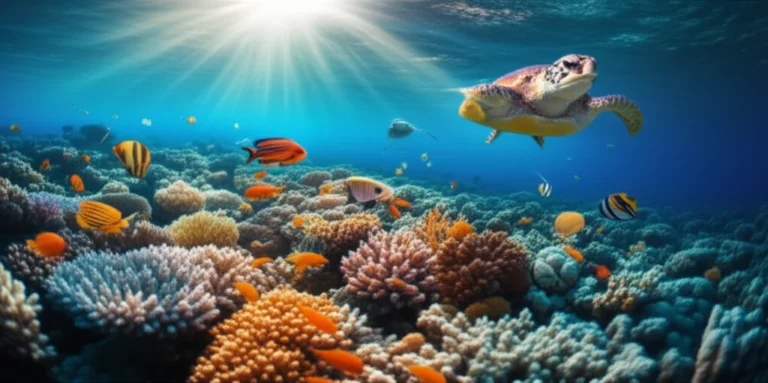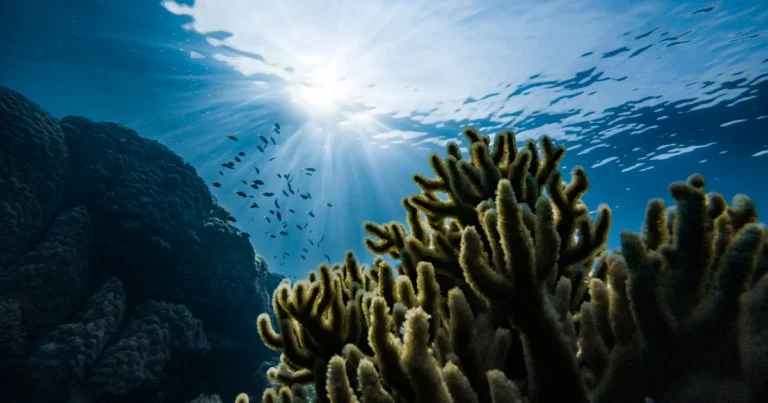Support our educational content for free when you purchase through links on our site. Learn more
Is Ocean Conservation a Global Issue? 9 Reasons Why 🌊 (2025)
Imagine a plastic bottle tossed into the sea off the coast of California, only to wash up years later on a remote beach in Japan. This isn’t just a quirky ocean tale—it’s a vivid example of why ocean conservation is undeniably a global issue. From the microscopic plastics drifting across currents to the migratory whales crossing international waters, the health of our oceans connects every corner of the planet.
In this article, we dive deep into the 9 critical reasons why ocean conservation demands global attention and action. We’ll explore how pollution, climate change, overfishing, and habitat loss ripple across borders, affecting ecosystems and human lives worldwide. Plus, we’ll share inspiring success stories, innovative solutions, and practical ways you can make waves from your own backyard. Ready to discover why protecting the ocean is truly a planet-wide mission? Let’s set sail!
Key Takeaways
- Ocean conservation is a global challenge because oceans connect continents and ecosystems without borders.
- Pollution, climate change, and overfishing have transboundary impacts that threaten marine biodiversity and human health worldwide.
- International cooperation and treaties are essential to tackle these issues effectively.
- Individuals and communities play a vital role through sustainable choices, advocacy, and citizen science.
- Innovative solutions like marine protected areas, sustainable fishing, and tech advances offer hope for ocean recovery.
- For ocean-friendly products, check out sustainable brands like 4ocean and Patagonia to reduce plastic waste and support conservation efforts.
👉 Shop Ocean-Friendly Products:
-
4ocean Ocean Cleanup Bracelets:
Amazon | 4ocean Official Website -
Patagonia Recycled Apparel:
Amazon | Patagonia Official Website
Table of Contents
- 🌊 Quick Tips & Salty Truths!
- Dive Deep: Unearthing the Ocean’s Conservation Story 🕰️
- The Big Splash: Is Ocean Conservation Truly a Global Tidal Wave? 🌍
- No Borders for Blue: Why Our Oceans Are the Ultimate Global Citizens 🌐
- The Great Global Gloop: Transboundary Pollution’s Pesky Path 🧪
- Climate Change’s Crushing Current: How It Sinks Our Seas 🌡️
- Fishing for Trouble: The Global Scourge of Overfishing & IUU 🎣
- Plastic Planet, Plastic Ocean: The Micro to Macro Menace ♻️
- Habitat Havoc: When Ocean Homes Go Bust 🏚️
- The Ocean’s Aches & Pains: A Deep Dive into Marine Maladies 🤕
- Who’s Steering the Ship? The Global Crew of Ocean Guardians 🧑✈️
- United for the Blue: The Power of International Organizations (UN, IUCN) 🤝
- Policy & Power: Governments Charting the Course (or Not!) 🏛️
- The Green Giants: NGOs Leading the Charge (Oceana, WWF, Surfrider) 🌱
- Science to the Rescue: Researchers Unraveling Ocean Mysteries 🔬
- Corporate Currents: Industry’s Role in Ocean Stewardship (or Strain) 🏭
- You, Me, and the Sea: The Mighty Impact of Individuals & Communities 🧍♀️🧍♂️
- Charting a New Course: Innovative Solutions for Ocean Revival 💡
- Sanctuaries of the Sea: The Magic of Marine Protected Areas (MPAs) 🏞️
- Hook, Line, & Sinker (Sustainably!): Revolutionizing Fishing Practices 🎣
- Beyond the Bin: Embracing a Circular Economy for a Plastic-Free Future 🔄
- Powering Up Green: Renewable Energy’s Role in Ocean Health ☀️
- Tech Tides: Gadgets & Gizmos for a Healthier Ocean 🤖
- From Awareness to Action: The Power of Ocean Education 📚
- Global Handshake: The Imperative of International Cooperation & Treaties 🤝
- Your Wave, Your Impact: Making a Difference, One Choice at a Time 👣
- Glimmers of Hope: Inspiring Ocean Conservation Success Stories ✨
- Rough Waters Ahead? Navigating the Roadblocks to Ocean Health 🚧
- The Horizon Ahead: What’s Next for Ocean Conservation? 🔭
- Conclusion: Riding the Wave Towards a Brighter Blue Future 🌊
- Recommended Links: Dive Deeper! 🔗
- FAQ: Your Burning Ocean Questions Answered 🔥
- Reference Links: Our Sources, Your Trusty Guides 📚
🌊 Quick Tips & Salty Truths!
Welcome aboard the Gone Greenish™ ocean conservation cruise! Before we dive deep, here are some fast facts and tips to keep your eco-compass pointed true blue:
- Oceans cover over 70% of Earth’s surface and produce more than half of the oxygen we breathe. 🌍 NOAA Ocean Facts
- Only about 8% of the ocean is currently protected, but scientists urge for at least 30% protection by 2030 to avoid catastrophic biodiversity loss. ✅ Conservation International
- Plastic pollution kills an estimated 1 million seabirds and 100,000 marine mammals annually. ❌ World Wildlife Fund
- Overfishing affects 34% of global fish stocks, pushing many species to the brink. 🎣 FAO Fisheries Report
- Climate change is warming oceans, causing acidification and coral bleaching—a triple threat to marine ecosystems. 🌡️ IPCC Special Report
Tip: Want to help? Start by reducing single-use plastics, supporting sustainable seafood, and advocating for marine protected areas. For more on how to make a difference, check out our Conservation Tips.
Curious how all these pieces fit into the global puzzle? Hang tight—we’re about to unravel the tides of ocean conservation!
Dive Deep: Unearthing the Ocean’s Conservation Story 🕰️
The ocean’s story is as old as time, but ocean conservation as a global movement is a relatively recent phenomenon. Let’s chart the course from past to present:
The Roots of Ocean Awareness
- Early civilizations revered the sea but largely exploited it without limits.
- The 20th century brought industrial fishing, pollution, and habitat destruction to unprecedented levels.
- The 1970s marked the birth of modern ocean conservation, with the establishment of organizations like the International Union for Conservation of Nature (IUCN) and the United Nations Convention on the Law of the Sea (UNCLOS).
Milestones in Global Ocean Protection
| Year | Milestone | Impact |
|---|---|---|
| 1982 | UNCLOS signed | Established legal framework for ocean use and conservation |
| 1992 | Earth Summit, Rio | Agenda 21 emphasized sustainable ocean use |
| 2000s | Rise of NGOs like Oceana and WWF | Increased public awareness and policy influence |
| 2010 | Aichi Biodiversity Targets | Set goals for marine protected areas (MPAs) |
| 2021 | UN Decade of Ocean Science begins | Boosts global research and cooperation |
Why It Matters to You
As the health nuts at Gone Greenish™, we see ocean conservation as not just an environmental issue but a human health and planetary survival issue. The ocean’s wellbeing directly affects climate regulation, food security, and even the air you breathe. Dive into our Climate Change category for more on these connections.
The Big Splash: Is Ocean Conservation Truly a Global Tidal Wave? 🌍
You might wonder, “Is ocean conservation really a global issue, or just a local concern for coastal countries?” Spoiler alert: It’s one of the most global challenges of our time. Here’s why:
No Borders for Blue: Why Our Oceans Are the Ultimate Global Citizens 🌐
- Oceans connect continents and countries, making pollution or overfishing in one area a problem for all.
- Currents carry plastics, chemicals, and invasive species thousands of miles.
- Migratory species like whales and turtles cross international waters, requiring multinational protection efforts.
The Great Global Gloop: Transboundary Pollution’s Pesky Path 🧪
- Nutrient runoff from agriculture causes dead zones far from the source.
- Oil spills and chemical discharges don’t respect borders.
- Microplastics have been found in the Arctic and deep ocean trenches alike.
Climate Change’s Crushing Current: How It Sinks Our Seas 🌡️
- Ocean warming affects weather patterns globally.
- Melting polar ice contributes to sea level rise threatening coastal megacities worldwide.
- Acidification disrupts marine food webs, impacting fisheries everywhere.
Fishing for Trouble: The Global Scourge of Overfishing & IUU 🎣
- Illegal, unreported, and unregulated (IUU) fishing undermines conservation efforts.
- Overfishing depletes fish stocks, threatening food security for billions.
- Global seafood trade means local fishery collapses ripple worldwide.
Plastic Planet, Plastic Ocean: The Micro to Macro Menace ♻️
- 8 million metric tons of plastic enter oceans yearly.
- Plastic breaks down into microplastics, infiltrating marine life and human food chains.
- Tackling plastic pollution requires global cooperation on waste management and product design.
Habitat Havoc: When Ocean Homes Go Bust 🏚️
- Coral reefs, mangroves, and seagrasses are critical habitats under threat.
- Their loss reduces biodiversity and coastal protection.
- Restoration efforts are underway but need global support.
For a comprehensive look at how these issues intertwine, check out the Carbon Footprint Reduction section on our site.
The Ocean’s Aches & Pains: A Deep Dive into Marine Maladies 🤕
Understanding the ailments afflicting our oceans helps us grasp the urgency. Here’s a deep dive into the ocean’s biggest health challenges:
Beyond the Bottle: Chemical, Noise, and Light Pollution’s Silent Scream 🔇
- Chemicals like pesticides and heavy metals accumulate in marine food webs.
- Noise pollution from shipping and drilling disrupts marine mammal communication.
- Artificial light affects the behavior of sea turtles and fish.
The Sour Seas: Understanding Ocean Acidification’s Bite 🍋
- CO₂ absorption lowers ocean pH, weakening shells and skeletons of marine organisms.
- Coral bleaching events are linked to acidification and warming.
- This threatens entire ecosystems and fisheries.
Vanishing Vistas: The Heartbreaking Loss of Marine Biodiversity 💔
- Species extinction rates in the ocean are accelerating.
- Loss of biodiversity reduces ecosystem resilience.
- Protecting biodiversity is essential for food security and climate regulation.
Ripple Effects: How Ocean Health Impacts Your Wallet & Well-being 💰
- Declining fish stocks threaten livelihoods of millions.
- Coastal communities face increased storm damage without natural barriers.
- Ocean health is directly tied to global economic stability.
For more on these connections, our readers love the Climate Change and Conservation Tips categories.
Who’s Steering the Ship? The Global Crew of Ocean Guardians 🧑✈️
Ocean conservation is a team sport. Let’s meet the global crew keeping the blue planet afloat:
United for the Blue: The Power of International Organizations (UN, IUCN) 🤝
- The United Nations leads global ocean governance through bodies like the UN Ocean Conference.
- The IUCN provides scientific expertise and conservation frameworks.
- These organizations foster international treaties and cooperation.
Policy & Power: Governments Charting the Course (or Not!) 🏛️
- Countries set fishing quotas, create MPAs, and regulate pollution.
- Some governments lead by example; others lag due to economic or political challenges.
- Enforcement remains a major hurdle.
The Green Giants: NGOs Leading the Charge (Oceana, WWF, Surfrider) 🌱
- Oceana boasts over 325 victories worldwide, pushing for science-based policies. Oceana
- WWF works on sustainable fisheries and marine habitat protection. WWF Oceans
- Surfrider Foundation mobilizes grassroots activism for coastal protection. Surfrider
Science to the Rescue: Researchers Unraveling Ocean Mysteries 🔬
- Marine scientists develop new tech like soft robotics to monitor ecosystems. Nature Ecology & Evolution
- Research informs policy and restoration efforts.
Corporate Currents: Industry’s Role in Ocean Stewardship (or Strain) 🏭
- Some companies adopt sustainable sourcing and reduce plastic packaging.
- Others contribute to pollution and overexploitation.
- Consumer pressure is shifting corporate behavior.
You, Me, and the Sea: The Mighty Impact of Individuals & Communities 🧍♀️🧍♂️
- Beach cleanups, citizen science, and advocacy make waves.
- Indigenous and local communities hold vital traditional knowledge.
- Every action counts!
Explore more about eco-conscious living in our Eco-Conscious Brands and Green Businesses categories.
Charting a New Course: Innovative Solutions for Ocean Revival 💡
The ocean’s future depends on bold, creative solutions. Here’s what’s making waves:
Sanctuaries of the Sea: The Magic of Marine Protected Areas (MPAs) 🏞️
- MPAs cover critical habitats, allowing ecosystems to recover.
- Success stories include the Great Barrier Reef Marine Park and Papahānaumokuākea Marine National Monument.
- Challenges: enforcement, funding, and balancing human use.
Hook, Line, & Sinker (Sustainably!): Revolutionizing Fishing Practices 🎣
- Innovations like selective gear reduce bycatch.
- Community-based fisheries management empowers locals.
- Certification programs (e.g., MSC) promote sustainable seafood.
Beyond the Bin: Embracing a Circular Economy for a Plastic-Free Future 🔄
- Designing products for reuse and recycling reduces ocean plastic.
- Brands like Patagonia and 4ocean lead with recycled materials. 4ocean Official
- Policy shifts toward banning single-use plastics gain momentum.
Powering Up Green: Renewable Energy’s Role in Ocean Health ☀️
- Offshore wind and tidal energy offer clean alternatives.
- Careful siting prevents habitat disruption.
Tech Tides: Gadgets & Gizmos for a Healthier Ocean 🤖
- Drones and AI monitor illegal fishing and pollution.
- Soft robotics explore fragile ecosystems without harm.
From Awareness to Action: The Power of Ocean Education 📚
- Programs like Ocean Literacy empower the next generation.
- Public engagement drives policy and behavior change.
Global Handshake: The Imperative of International Cooperation & Treaties 🤝
- The upcoming UN Treaty on the High Seas aims to protect biodiversity beyond national jurisdictions.
- Cooperation is key to tackling transboundary threats.
For detailed strategies, our Conservation Tips category is a treasure trove.
Your Wave, Your Impact: Making a Difference, One Choice at a Time 👣
Feeling small in the vast ocean? Don’t! Your choices ripple outward:
Shopping Smart: Consumer Choices That Make a Splash 🛒
- Choose seafood certified by the Marine Stewardship Council (MSC) or Aquaculture Stewardship Council (ASC). MSC Seafood Finder
- Support brands using recycled or biodegradable packaging.
- Reduce single-use plastics and opt for reusable alternatives.
Voice of the Ocean: Becoming a Blue Advocate 🗣️
- Write to policymakers demanding stronger ocean protections.
- Join local beach cleanups and conservation groups.
- Share ocean facts and stories on social media to raise awareness.
Citizen Scientists Unite! Lending a Hand to Ocean Research 🧑🔬
- Participate in programs like Reef Check or eBird for seabirds.
- Collect data on plastic pollution or species sightings.
- Your observations help scientists track ocean health trends.
Glimmers of Hope: Inspiring Ocean Conservation Success Stories ✨
Not all is doom and gloom! Here are some inspiring wins:
- Recovery of the humpback whale populations after decades of whaling bans.
- Expansion of marine protected areas: Over 1.1 million square kilometers added since 2019. Conservation International
- Plastic bans in countries like Kenya and the EU leading to measurable reductions.
- Community-led coral restoration projects in the Philippines and Australia.
- Technology-driven enforcement reducing illegal fishing in the Pacific.
At Gone Greenish™, we love these stories because they prove that collective action works. Want to be part of the next success? Check out our Conservation Tips for actionable steps.
Rough Waters Ahead? Navigating the Roadblocks to Ocean Health 🚧
Despite progress, challenges loom large:
- Political will varies widely; some nations prioritize short-term gains over sustainability.
- Funding gaps limit enforcement and research.
- Conflicting interests between fishing, shipping, and conservation.
- Climate change accelerates faster than mitigation efforts.
- Data deficiencies hamper effective decision-making.
The question remains: how do we overcome these obstacles before it’s too late? Our experts at Gone Greenish™ believe the answer lies in innovative partnerships, education, and persistent advocacy.
The Horizon Ahead: What’s Next for Ocean Conservation? 🔭
Looking forward, here’s what’s on the radar:
- UN High Seas Treaty expected to create new protections beyond national waters.
- Blue carbon initiatives to harness ocean ecosystems for climate mitigation.
- Emerging tech like biodegradable fishing gear and AI-powered monitoring.
- Increased integration of Indigenous knowledge in conservation planning.
- Youth-led movements gaining momentum globally.
The ocean’s future is still unwritten. Will humanity rise to the challenge? We say yes — but only if we all paddle in the same direction. 🌊
Conclusion: Riding the Wave Towards a Brighter Blue Future 🌊
So, is ocean conservation a global issue? Absolutely — and it’s one of the most urgent, complex, and interconnected challenges we face today. From the plastic choking our seas to the warming waters threatening coral reefs, the ocean’s health is a mirror reflecting the health of our entire planet.
We’ve seen how pollution, overfishing, climate change, and habitat destruction don’t respect borders, making ocean conservation a truly global endeavor. The good news? International organizations, governments, NGOs, scientists, businesses, and individuals all have vital roles to play in steering the ship toward recovery.
At Gone Greenish™, we believe that every action counts — whether it’s choosing sustainable seafood, reducing plastic use, supporting marine protected areas, or advocating for stronger policies. The ocean’s future depends on a global tidal wave of cooperation, innovation, and care.
Remember those unresolved questions about how your choices ripple outward? Now you know: your daily habits, your voice, and your support for ocean-friendly initiatives are powerful tools for change. Together, we can ride the wave toward a healthier ocean and a healthier planet.
Ready to dive in? Let’s make waves! 🌊💙
Recommended Links: Dive Deeper! 🔗
👉 Shop Sustainable & Ocean-Friendly Products:
-
4ocean Ocean Cleanup Bracelets:
Amazon | 4ocean Official Website -
Patagonia Recycled Apparel:
Amazon | Patagonia Official Website -
MSC Certified Seafood Finder:
MSC Seafood Finder
Recommended Books on Ocean Conservation:
-
The Ocean of Life: The Fate of Man and the Sea by Callum Roberts
Amazon -
Blue Future: Protecting Water for People and the Planet Forever by Maude Barlow
Amazon -
Plastic Ocean: How a Sea Captain’s Chance Discovery Launched a Determined Quest to Save the Oceans by Charles Moore
Amazon
FAQ: Your Burning Ocean Questions Answered 🔥
What are the main threats to ocean conservation and how do they impact human health?
The primary threats include plastic pollution, overfishing, climate change, habitat destruction, and chemical contamination. These threats degrade marine ecosystems, which are critical for food security, oxygen production, and climate regulation. For example, microplastics enter the human food chain through seafood, potentially causing health issues. Overfishing jeopardizes protein sources for billions, and climate change-driven ocean warming affects weather patterns that influence agriculture and disease spread. Protecting oceans is thus essential for both environmental and human health.
How does pollution in the ocean affect the food chain and our well-being?
Pollutants like plastics, heavy metals, and chemicals accumulate in marine organisms, moving up the food chain in a process called biomagnification. This means top predators, including fish we consume, can contain high levels of toxins. These contaminants can cause neurological, reproductive, and immune system problems in humans. Moreover, pollution harms marine biodiversity, weakening ecosystem services that support fisheries and coastal protection, indirectly impacting human livelihoods and safety.
What role do individuals play in protecting the ocean and promoting a healthy planet?
Individuals wield significant power through daily choices and advocacy. Reducing single-use plastics, choosing sustainable seafood, participating in beach cleanups, and supporting ocean-friendly brands all contribute. Additionally, raising awareness and pressuring policymakers to enact stronger protections amplify impact. Citizen science initiatives also enable individuals to contribute valuable data for research. Collectively, these actions create a ripple effect that supports global ocean conservation.
Can climate change be mitigated through effective ocean conservation strategies?
Yes! Oceans absorb about 30% of human-generated CO₂ and store vast amounts of heat, making them critical in climate regulation. Protecting and restoring blue carbon ecosystems like mangroves, seagrasses, and salt marshes enhances carbon sequestration. Sustainable fisheries and pollution reduction also improve ocean resilience to climate impacts. While ocean conservation alone can’t solve climate change, it is a vital piece of the mitigation and adaptation puzzle.
How do marine protected areas contribute to maintaining healthy oceans and ecosystems?
Marine Protected Areas (MPAs) provide safe havens where ecosystems can recover and thrive without human pressures like fishing or pollution. They help rebuild fish stocks, protect biodiversity, and enhance ecosystem services such as coastal protection and carbon storage. Well-managed MPAs also support local economies through sustainable tourism and fisheries. However, MPAs must be adequately enforced and designed with community involvement to be effective.
What are some simple daily habits that can help reduce plastic waste in the ocean?
- Use reusable bags, bottles, and straws instead of single-use plastics.
- Avoid products with excessive plastic packaging.
- Participate in local beach or river cleanups.
- Support brands committed to plastic reduction and recycling.
- Properly dispose of waste and recycle whenever possible.
- Educate others about the impact of plastic pollution.
These habits, multiplied by millions, create a powerful force against ocean plastic.
Are there any international efforts or organizations working to address global ocean conservation issues?
Absolutely! The United Nations leads global ocean governance through initiatives like the UN Ocean Conference and the upcoming High Seas Treaty to protect biodiversity beyond national waters. Organizations such as the International Union for Conservation of Nature (IUCN), Conservation International, and NGOs like Oceana and WWF spearhead science-based conservation, policy advocacy, and community engagement worldwide. These collaborative efforts are essential to tackle transboundary threats and promote sustainable ocean stewardship.
How can technology and innovation accelerate ocean conservation efforts?
Emerging technologies like soft robotics, AI-powered monitoring, and biodegradable materials are revolutionizing ocean conservation. Soft robotics allow non-invasive exploration of fragile ecosystems, while AI helps detect illegal fishing and pollution hotspots in real time. Innovations in materials science reduce plastic waste by creating biodegradable alternatives. These tools enhance research, enforcement, and sustainable practices, making conservation more effective and scalable.
Reference Links: Our Sources, Your Trusty Guides 📚
- NOAA Ocean Facts
- Conservation International Center for Oceans
- Oceana | Protecting the World’s Oceans
- World Wildlife Fund – Plastic Pollution
- FAO State of Fisheries and Aquaculture
- IPCC Special Report on Ocean and Cryosphere
- Marine Stewardship Council (MSC)
- Surfrider Foundation
- Nature Ecology & Evolution Article on Marine Conservation
- 4ocean Official Website
- Patagonia Official Website
Ready to make waves? 🌊 Dive into our other eco-conscious guides at Gone Greenish™ and join the global movement to protect our blue planet!






